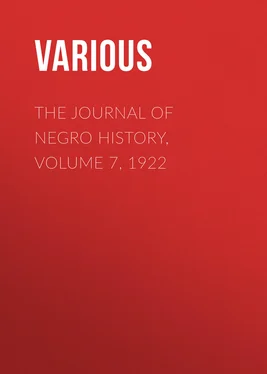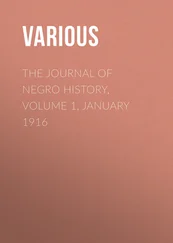Various - The Journal of Negro History, Volume 7, 1922
Здесь есть возможность читать онлайн «Various - The Journal of Negro History, Volume 7, 1922» — ознакомительный отрывок электронной книги совершенно бесплатно, а после прочтения отрывка купить полную версию. В некоторых случаях можно слушать аудио, скачать через торрент в формате fb2 и присутствует краткое содержание. Жанр: foreign_antique, periodic, История, foreign_edu, на английском языке. Описание произведения, (предисловие) а так же отзывы посетителей доступны на портале библиотеки ЛибКат.
- Название:The Journal of Negro History, Volume 7, 1922
- Автор:
- Жанр:
- Год:неизвестен
- ISBN:нет данных
- Рейтинг книги:3 / 5. Голосов: 1
-
Избранное:Добавить в избранное
- Отзывы:
-
Ваша оценка:
- 60
- 1
- 2
- 3
- 4
- 5
The Journal of Negro History, Volume 7, 1922: краткое содержание, описание и аннотация
Предлагаем к чтению аннотацию, описание, краткое содержание или предисловие (зависит от того, что написал сам автор книги «The Journal of Negro History, Volume 7, 1922»). Если вы не нашли необходимую информацию о книге — напишите в комментариях, мы постараемся отыскать её.
The Journal of Negro History, Volume 7, 1922 — читать онлайн ознакомительный отрывок
Ниже представлен текст книги, разбитый по страницам. Система сохранения места последней прочитанной страницы, позволяет с удобством читать онлайн бесплатно книгу «The Journal of Negro History, Volume 7, 1922», без необходимости каждый раз заново искать на чём Вы остановились. Поставьте закладку, и сможете в любой момент перейти на страницу, на которой закончили чтение.
Интервал:
Закладка:
The morning session of the 15th at the Virginia Theological Seminary and College was called to order by the newly elected President, Prof. John R. Hawkins. The Director, Dr. C. G. Woodson, was then introduced. He showed how the Negro is a menace to the position of the white man in trying to maintain racial superiority. The significant achievements of the Negro in Africa and this country were passed in rapid review to show how untenable this position of the white man is and how unlikely it can continue in view of the fact that the Negro is accomplishing more now than ever before in the history of the race. Professor John R. Hawkins then delivered a brief address showing how the development of the schools and the maintenance of the proper school spirit through teachers and students can be made effective in the social uplift of the race. President Trigg of Bennet College then followed with impressive remarks expressing his interest in the cause and his confidence in those who are now doing so much to preserve the records of the Negro and to popularize the study of them throughout this country and abroad.
There was no afternoon session of the Association except a brief meeting of the Executive Council, to which the public was not invited. The conference closed with the evening session at the Eighth Street Baptist Church, where a large audience was addressed by Dr. I. E. McDougle, of Sweet Briar College, Dr. E. Crooks, of Randolph-Macon College, and Professor Bernard Tyrrell of the Virginia Theological Seminary and College. Dr. McDougle briefly discussed Negro history as a neglected field, showing that it is generally unexplored, and introducing an abundance of material which may be discovered with little effort. He spoke, moreover, of Negro History as a neglected subject, giving statistical information as to the places where the subject is now being taught and the manner in which such instruction is offered. Dr. Crooks spoke for a few minutes on self-respect as a means by which the race may develop power. He unfortunately, however, drifted into a discussion of certain phases of the race problem and disgusted his audience by advancing ideas with which, as he was informed, Negroes cannot agree. Professor Tyrrell then delivered a scholarly address on Negro ancestry and brought forward from his study of ancient history and especially that of Africa, facts showing that the Negro race has made a record of which it may well feel proud. He explained, moreover, how historians since the early days have become prejudiced against the proper treatment of the achievements of Africans and have endeavored to convince the world that the record of the race is not significant.
Конец ознакомительного фрагмента.
Текст предоставлен ООО «ЛитРес».
Прочитайте эту книгу целиком, купив полную легальную версию на ЛитРес.
Безопасно оплатить книгу можно банковской картой Visa, MasterCard, Maestro, со счета мобильного телефона, с платежного терминала, в салоне МТС или Связной, через PayPal, WebMoney, Яндекс.Деньги, QIWI Кошелек, бонусными картами или другим удобным Вам способом.
1
Muzzey, History of the United States , p. 304.
2
Ingle, Southern Sidelights , p. 18.
3
Ibid. , p. 18.
4
Dodd, Cotton Kingdom , p. 71.
5
Ibid. , p. 72.
6
Rhodes, History of the United States , Vol. I, p. 361.
7
Ingle, Southern Sidelights , p. 45.
8
Ibid. , p. 40.
9
DeBow, Industrial History of the United States , Vol. II, p. 303.
10
Adams, Three Months in the South , p. 82.
11
Rhodes, History of the United States , Vol. I, 317.
12
Hart, Slavery and Abolition , p. 100.
13
Dodd, Cotton Kingdom , p. 75.
14
Hart, Slavery and Abolition , p. 100.
15
The resolution was: "The association is sensibly affected by the death of the Rev. Andrew Bryan, a man of color, and pastor of the first colored Church in Savannah. This son of Africa, after suffering inexpressible persecutions in the cause of his Divine Master, was at length permitted to discharge the duties of the ministry among his colored friends in peace and quiet, hundreds of whom, through his instrumentality, were brought to the knowledge of the truth as it is in Jesus. He closed his extensively useful, and amazingly luminous course, in the lively exercise of faith, and in the joyful hope of a happy immortality." See Benedict's History of the Baptists .
16
Semple, History of the Baptists in Virginia , p. 355.
17
Semple, History of the Baptists in Virginia , p. 356.
18
The Negro Year Book , 1918-1919, p. 236; Benedict, History of the Baptists , 376.
19
By way of comparison, be it further remembered, that the founder of the African Methodist Episcopal Church was originally a member of the St. George Society, of Philadelphia, Pennsylvania, and he and others withdrew from that body of white persons in 1787; but it was not until 1794, that Bishop Francis Asbury constituted the Bethel A. M. E. Church at Philadelphia, which claims to be the oldest Negro Methodist church in the country. The Zion Church, of the African Methodist Episcopal Zion connection, New York City, was founded in 1796, while the first church of Negro Episcopalians, the St. Thomas Church, Philadelphia, was planted by Bishop William White in 1794. The Lombard Street Presbyterian Church, Philadelphia, the oldest organization of Negro Presbyterians in America, was constituted in 1807, and not until 1829 was the first church of Negro Congregationalists, the Dixwell Avenue of New Haven, Conn., constituted.
20
Richard Kennard's History of the Gillfield Baptist Church , p. 16.
21
Let me quote here a paragraph from Sprague's Annals of the American Pulpit , Vol. VI, p. 583, (Ed. 1860, published by Robert Carter and Brother, New York.) The paragraph appears in an article which the publisher takes from Taylor's Memoirs.—Missionary Heroes and Martyrs .
"In 1850, the late Rev. Eli Ball of Virginia, visited all the Liberian Baptist Missionary Stations, as agent of the Southern Baptist Missionary Convention, and, with considerable difficulty, ascertained the spot where Lott Cary was buried. The next year, a small marble monument was sent out, and placed over the grave, with the following inscription:—
"On the front of the monument was—
On the reverse—
Читать дальшеИнтервал:
Закладка:
Похожие книги на «The Journal of Negro History, Volume 7, 1922»
Представляем Вашему вниманию похожие книги на «The Journal of Negro History, Volume 7, 1922» списком для выбора. Мы отобрали схожую по названию и смыслу литературу в надежде предоставить читателям больше вариантов отыскать новые, интересные, ещё непрочитанные произведения.
Обсуждение, отзывы о книге «The Journal of Negro History, Volume 7, 1922» и просто собственные мнения читателей. Оставьте ваши комментарии, напишите, что Вы думаете о произведении, его смысле или главных героях. Укажите что конкретно понравилось, а что нет, и почему Вы так считаете.












